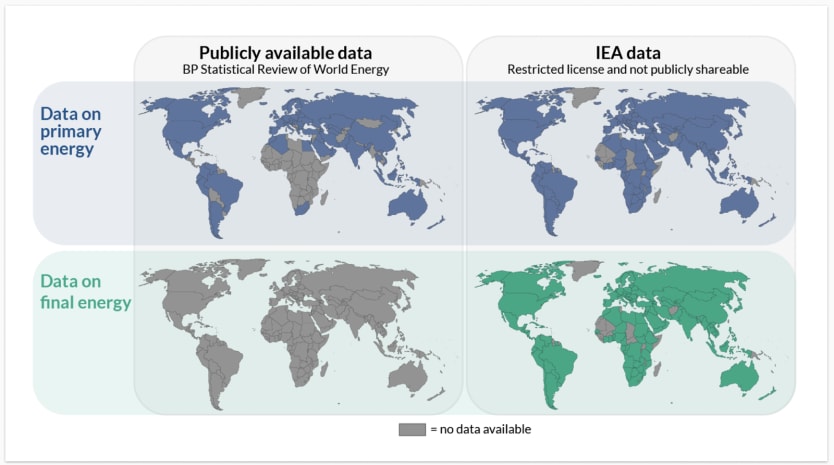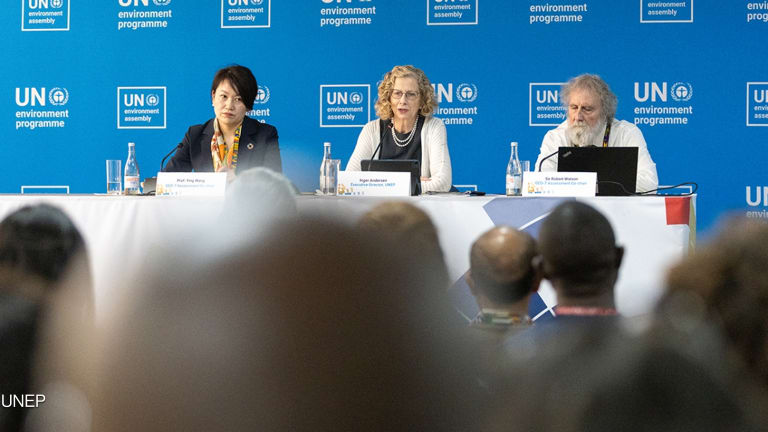
As we enter 2022 and countries get ready to make good on the promises from the United Nations Climate Change Conference, understanding our global, national, and subsector energy systems will be a necessary condition for addressing climate change and navigating the planet’s energy transition to zero carbon. Yet public access to global energy data is not available, hindering our ability to effectively plan, implement, and measure the energy transition, especially in an international development context.
The good news? Comprehensive global energy datasets already exist and are located in one central place, and removing the access barrier would be incredibly inexpensive.
Few problems associated with the climate crisis are easy or cheap to solve. This one is.
—Specifically, large swaths of the international energy data landscape lie behind a hefty paywall from the International Energy Agency, an intergovernmental organization supported by country agencies and public funds from across the globe.
This current barrier to accessing basic energy data — much of the IEA dataset is available nowhere else, especially the portions relevant to the global south — prevents an ecosystem of researchers, policy experts, and public and private sectors from measuring progress, tracking accountability, and building solutions for the climate emergency.
As the co-founder of an environmental nonprofit that opened up the largest existing global dataset of another climate-relevant quantity — government-measured outdoor air quality — I have observed firsthand what happens when previously siloed environmental data becomes accessible to the public.
Over the course of five years, I saw new access to billions of air quality data points make possible and improve hundreds of air pollution analyses and projects across the world. These range from work by NASA — for the launch of a new public health satellite mission to analyze the impact of air pollution on health in cities in both the global north and global south — to apps that democratized the information, making air pollution understandable and actionable to communities in their local contexts.
With regard to climate, opening up core global energy data is an even stronger imperative than doing so for air pollution data.
Comprehensive country-level data on “primary energy” — or energy as it is first extracted from nature, like coal from the ground — is simply not publicly available for many countries in Africa and Asia. Meanwhile, country-level data on “final energy” — or the form of energy delivered to consumers for actual consumption, like electricity to your house — is not publicly available across the globe. This information is only available through IEA’s closed datasets.
Without it, subsectors and nations cannot accurately model their energy usage or develop projections for usage in a range of scenarios, and ultimately they are unable to manage their transition to zero-carbon economies. Essentially, this lack of data access is like trying to plan a road trip with no map.

So why does the paywall exist around this essential energy data? IEA member countries’ energy ministries, including the U.S. Department of Energy, require that the international agency generate a portion of its own funding, in addition to member contributions.
IEA primarily achieves this by charging for access to its global energy datasets, which is prohibitively expensive for many entities around the world and prevents organizations that do have access from sharing their analyses fully, due to restrictive data license agreements.
The paywall drums up a sum total of $6.3 million for IEA annually. In other words, for barely $6 million, the world could have access to this energy data that is vital for solving the climate crisis.
Doing the math, IEA’s 30 member countries would only have to kick in an additional $210,000 each to unlock this data for the public, which largely funds its creation in the first place. Heck, billionaire Elon Musk could cover the cost with what he makes in less than half an hour. A petition has recently been set up for the public, calling for member countries to remove this paywall.
IEA itself makes the best case for opening up the data: “Consistent, accurate and timely energy data and statistics are fundamental to developing effective and efficient national energy policies, as well as a key element in longer-term planning for investment in the energy sector. To this end, the IEA provides the world’s most authoritative and comprehensive source of global energy data.”
Opening up data isn’t as glamorous as signing a climate pledge, nor does it solve the climate crisis on its own. But the old adage “you can’t manage what you don’t measure” stands true, and making basic global climate and energy datasets available for the full force of the world’s brain power is an absolute must in moving forward on the pledges from the U.N. climate conference.
Few problems associated with the climate crisis are easy or cheap to solve. This one is.







